An African boy fulfils his Kung fu dream in China
(China Daily)
14:21, July 16, 2013
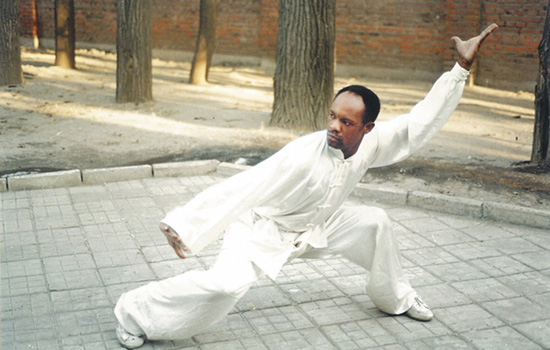
A young African boy came to China to look for the flying heroes he had seen in kung fu movies. He did not learn to fly, but other lessons had made him a hero in his own homeland, and an ambassador in China, where he has stayed for the last 30 years. He Na finds out the details.
Children often have big dreams, to stand in the limelight in front of the cameras, the football field, or even in politics, but perhaps Luc Bendza had the grandest dream of them all. He wanted to fly.
It was a special kind of flight he dreamt about - to be able to float through the air like all those heroes he saw in Chinese kung fu movies.
While flight has proven impossible, the 43-year-old from Gabon's fascination with Chinese kung fu did lead him to great things. He has won several international martial arts awards, he speaks fluent Mandarin, and he has appeared in several movies and made numerous appearances on Chinese television.
In addition to his acting, Bendza now works as a cultural consultant at the China-Africa International Cultural Exchange and Trade Promotion Association in Beijing.
Kung fu movies were popular in Gabon in the 1980s and Bendza was a huge fan.
"I really admired those people in the movies who could fly. They were able to fight for justice and help the poor. I wanted to be just like them, but when I told my mother I wanted to go to China and learn to fly she thought I was crazy," he recalls.
Bendza began by studying Chinese with the help of Wang Yuquan, a translator working with a Chinese medical team in Gabon. Sometimes he skipped school to study with Wang, and also called him in the evenings to talk about China.
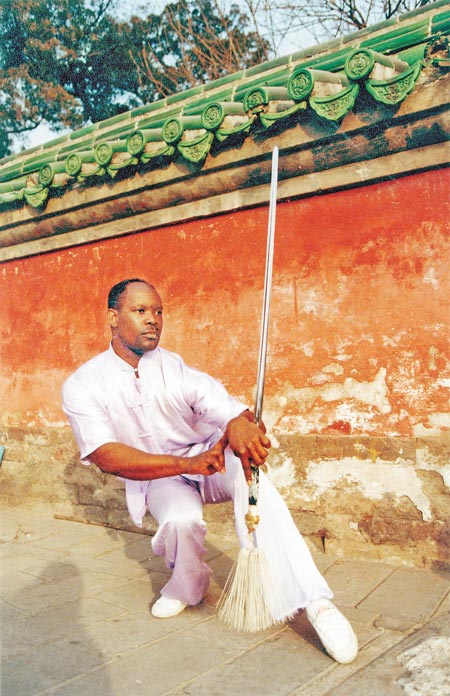
Luc Bendza practices the Chinese martial arts with a sword. (China Daily)
"When my mother heard me speaking Chinese on the phone she was surprised," he says.
"She even took me to see a psychiatrist. But I told her that I had made my decision no matter whether she agreed or not."
Then Bendza opened a video rental store without telling his parents and saved $1,000 to help fund his move.
"In the 1980s, $1,000 was really a lot of money. When I presented the money to my parents I could see the surprise on their faces," he says. "After they had confirmed the money wasn't stolen they both sighed with relief."
But they were still not convinced. What finally swayed them was a phone call from Wang.
"I begged Wang to make the call," says Bendza. "Wang told my parents how serious I was and asked them to give me a chance."
Bendza's parents were both government officials and had hoped he would follow in their footsteps. However, they accepted his plans, while also betting with their son that he would soon return.
It was 1983 when Bendza moved to China, at just 14 years old. There were no direct flights so he was forced to travel through several countries on a long arduous journey.
"It was a really long and complicated journey for a child, but luckily I wasn't abducted by traffickers," he says.
Bendza's uncle worked at the Gabon embassy in Beijing and picked him up at the airport.
"He was puzzled that I kept looking left and right, my eyes searching for something," says Bendza. "I was looking for people who could fly."
His uncle laughed when he said this and explained that it was movie technicians who made people fly.
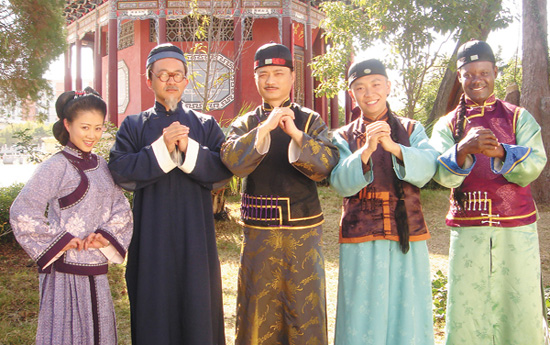
Bendza shows up in a TV series in traditional Chinese costume. (China Daily)
"I kept saying no and begged him to find the flying people for me. So he took me to Beijing Film Studio where I saw actors flying, hauled into the air on ropes," he says.
He was disappointed and after just two months in Beijing, decided to go to Shaolin Temple in Henan.
"There were few foreigners in China in the 1980s, especially black people from African countries. Wherever I went people pointed fingers at me like I was from another planet, but I wasn't annoyed because they were all very friendly," he says.
"The people at Shaolin Temple were really amazing. Although they couldn't fly like in the movies, still their martial arts made a deep impression on me. I told myself I had gone to the right place."
Bendza's Mandarin still wasn't good, so after less than a year he left the temple and returned to Beijing where he studied Mandarin at university for a year.
After that he enrolled at the Beijing Sport University studying traditional Chinese martial arts.
"I stayed at the university for more than 10 years and finished both bachelor and postgraduate studies," he says.
"I really need to thank those teachers who not only taught me Chinese martial arts history and other subjects, but also helped me build a solid foundation for being a real martial artist."
Bendza's natural aptitude for martial arts, and hard training saw him progress rapidly and won him recognition from many martial art masters.
"The teacher would put a nail with the sharp end up under your bum when you were practicing a stance so if you lowered yourself too far the nail would hurt you," Bendza recalls.
The tough training paid off though as Bendza won awards in China and abroad.
He also attracted the eye of directors and he went on to play roles in both movies and television series.
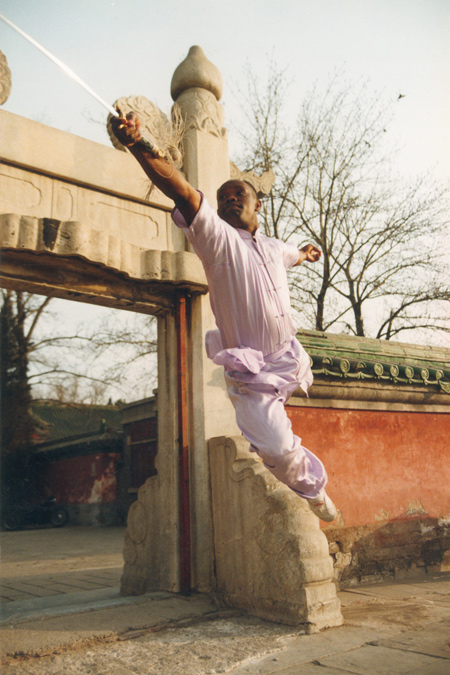
He did not tell his mother about these successes, and she only found out when she read about him winning an international martial arts competition in France.
Bendza began to gain recognition for his achievements in Gabon, but the media there were initially unkind. One newspaper ran a front-page cartoon of him standing with two suitcases, a foot in China and a foot in Gabon, but with his head turned toward China. The insinuation was that he had turned his back on his homeland.
"The media used the cartoon to show their dissatisfaction," he says. "When I returned to Gabon my mother told me I had to do something to change this bias against me. She took it very seriously."
Bendza organized a free martial arts show as a way of changing opinions and media coverage become more positive.
"When I left, my parents saw me off at the airport and told me they thought I was great. When they said that and my mother hugged me, I cried like a baby. That was the first time in 10 years I had won recognition from my mother," he says.
Martial arts changed his life and he has hopes to promote it across Africa. But his work has also moved away from purely performing toward promoting cultural exchanges.
As a member of International Martial Arts Association, he organizes Chinese martial arts teams to perform and teach in Africa.
Bendza has been in China for 30 years and witnessed the country's reform and opening up process. He married his Chinese wife in 2007 and they have a 16-month-old son.
"I have become used to life in China and enjoy being here with my family very much," he says.



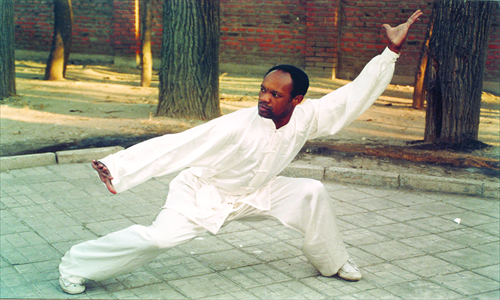

 Reply With Quote
Reply With Quote




